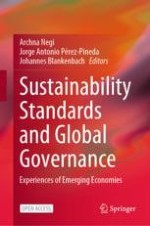Open Access 2020 | Open Access | Book

Sustainability Standards and Global Governance
Experiences of Emerging Economies
Editors: Dr. Archna Negi, Dr. Jorge Antonio Pérez-Pineda, Johannes Blankenbach
Publisher: Springer Singapore
Open Access 2020 | Open Access | Book

Editors: Dr. Archna Negi, Dr. Jorge Antonio Pérez-Pineda, Johannes Blankenbach
Publisher: Springer Singapore
This open access book focuses on the issue of sustainability standards from the perspective of both global governance frameworks and emerging economies. It stems from the recognition that the accelerated pace of economic globalization has generated production and consumption patterns that are generating sustainability concerns. Sustainability standards (and regulations) are increasingly being used in a bid to make global consumption and production more sustainable. Given the dense inter-connectedness of economic affairs globally, the use of sustainability standards has become a concern of global governance, who face the challenge of achieving a balance between the use of standards for genuine sustainability objectives, and not allowing them to turn into instruments of protectionism or coercion.The emerging economies, given their increasing engagement with the global economy, are most impacted by the use of sustainability standards. The emphasis of ‘emerging economies’ in this book is retained both by using case studies from these economies and by collating perceptions and assessments of those located in these economies. The case studies included span sectors such as palm oil, forestry, food quality, vehicular emissions and water standards, and address the problems unique to the emerging economies, including capacity building for compliance with standards, adapting international standards in domestic contexts and addressing the exclusion of small and medium enterprises etc.
Complex interfaces and dynamics of a global nature are not limited to the thematic of this book but also extend to the process through which it was written. This book brings together insights from developed as well as emerging economies (Germany, India, Mexico, Brazil, Indonesia, Pakistan, Mexico and China). It also brings together scholars and practitioners to jointly ponder upon the conceptual aspects of the global frameworks for sustainability standards. This book is a very useful resource for researchers and practitioners alike, and provides valuable insights for policy makers as well.